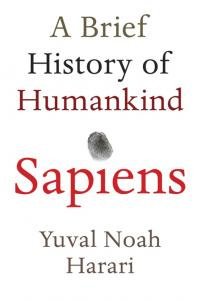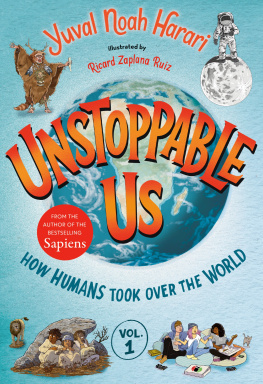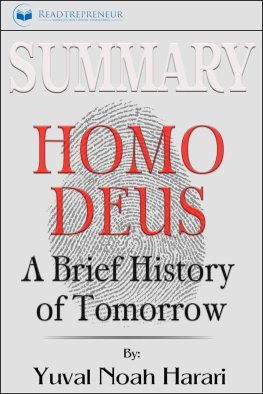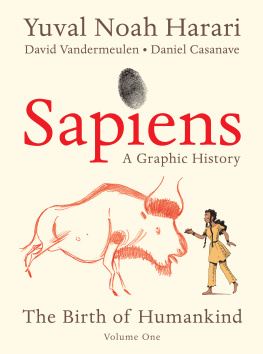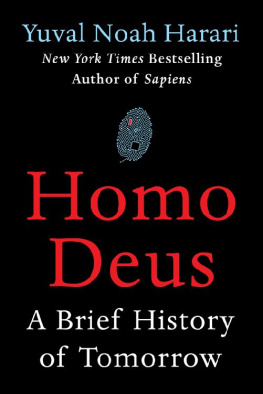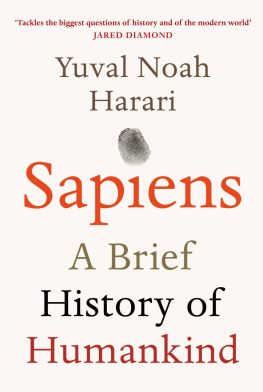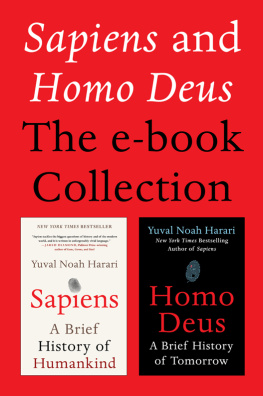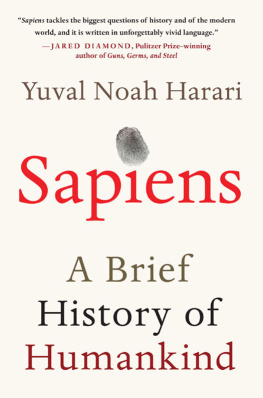SAPIENS EDITORIAL
Summary Of "Sapiens: A Brief History Of Humankind - By Yuval Noah Harari"
Sapiens Editorial
2017 Sapiens Editorial /Sapiens Editorial
All rights reserved.
Author: Sapiens Editorial
Contact Data (sapienseditorial@gmail.com)
ISBN: 9783962554828
SUMMARY OF
SAPIENS
A BRIEF HISTORY OF HUMANKIND
BY YUVAL NOAH HARARI
SUMMARY WRITTEN BY:
SAPIENS EDITORIAL
THE ORIGINAL BOOK
Sapiens presents a pleasant and simple narrative about the extraordinary story of the evolution of mankind. In this work, it shows a detailed vision that everything we learn in school about history doesnt teach us anything about how our species spread throughout the world. How big cities and empires occurred, what made us believe in Gods, why did money arise? From that curious and interesting past, we are also presented with a projection into the future, towards the millenniums to come.
It is a well narrated chronical of life. From the first humans that inhabited the earth, all the way to the considerable progress like the great cognitive, agricultural and scientific revolutions. This work has drawn interest from universities and the public. Making the young writer an international celebrity.
CONTENT
THE ORIGIN
The Big Bang is one of the theories we have learned in school since we were kids, which is about the origin of matter and energy. It says that 13,500 million years ago, the universe was in a state of great intensity and then expanded. About 300,000 years later, matter and energy started combining complex structures, atoms, which at the same time united in molecules. 3,800 years ago, on planet Earth, some molecules combined shapes to form organisms, Homo Sapiens among them. 70,000 years prior, the species Homo Sapiens formed into more complex structures called cultures. The development of these cultures is called history.
There are three important revolutions that marked history. Cognitive, which started around 70,000 years ago, the agricultural revolution, which became obvious about 12,000 years ago, and the scientific one, which only started 500 years ago.
And just as expected, this history of revolutions and transformations affected humans and their way of organizing.
HUMANS AND THEIR HISTORY
Eastern Africa is where the first humans appeared around two and a half million years ago. Descendants of Australopithecus (austral apes), left their native land and headed north of Africa to Europe and Asia. The geographical conditions of the places where they were established, required necessary adaptations for survival. Therefore, the populations evolved with unique features. As a result, a variety of species originated. Among them, Homo Neanderthalensis, commonly known as Neanderthals were the humans in Europe and Western Asia. Homo Erectus, upright men, inhabited eastern Asia for two million years and it was the most enduring species known till now. Homo Sapiens, our species, arose 300,000 years ago and still dominates the planet in which all previous species have died out.
A SINGULAR BEING
Aside from all the differences from comparing human species, there are also several common features. The most evident is the size of the brain. It is very large in comparison to other animals. It is two or three percent of our total body weight and it uses 25 % of body energy.
Another human feature is walking upright on two legs. It is a position that enables to look at far distances and it allows the hands to fall freely to be able to occupy them with something.
The development of women in communities allowed for premature births. Although, due to the nature of dependency of offspring, the need for strong social bonds facilitated the development and education of humans born without any skills.
A large brain, the use of utensils, superior learning capacities and complex social structures were the advantages that would turn mankind into the most powerful species on Earth. Many historic catastrophes were the consequence that humans were ambivalent of being superior but fearful inferiors.
The fire was the first great discovery which opened an important gap between man and animals. It entitled man to really feel superior, for it gave the control of a potentially unlimited force.
THE EXPANSION
Sapiens invaded Earth which lead to the dying out of other human species. The debate around the cause for this supremacy is open, and scientists have not come to an agreement yet. Some talk about a cross between species, others speak of extermination. Whatever the reason may be, the truth is that it is the species which boosted on the planet.
Master of the world, Homo Sapiens began to produce culture, art, jewellery, religion, commerce and social strata; there are scientifically studied testimonies. These creations were the consequences of a revolution in Sapiens cognitive capabilities. A result, perhaps of genetic mutations which changed the internal wiring of the brain. This allowed them to think and communicate in a totally new way, giving way to the use of language.
Two theories co-exist which try to explain the emergence of language in mankind. One of them considers that its upsurge was the natural evolutive path to benefit survival and reproduction, based on a tool of protection against predators and other dangers. The other one suggests that our language evolved as a means of sharing information about humans, according to which Homo sapiens are a social animal.
Both theories are probably partially correct, but what makes our language unique is the ability to refer to things have never been seen or heard of before.
With this cognitive revolution, legends, myths, Gods and religions came along. It forced Sapiens to live in a dual reality. In one hand, an objective and palpable reality, formed by trees, animals, lions, and on the other hand, the reality imagined by the Gods, nations and associations. The latter one became stronger, up to the point of outweighing and controlling the first one. The world of representation was more determining than the world of tangible objects.
As of that cognitive revolution, Sapiens started to rapidly change their behaviours and own their history. They passed their teachings onto newer generations, transforming social strata, the nature of its interpersonal relationships and their economic activities. They planned complex actions to avoid predators, gathering and stocking up on food, and created cooperative groups of mutual protection.
They were no longer dependent on their environment. They ceased being controlled by it and they became the controllers.
INHERITANCE
Evolutive psychology implies that most of our social and psychological characteristics were shaped and moulded during these times in the past, which hunting and gathering marked the minds of Sapiens. Our eating and sexual habits as well as our present conflicts, seem to be the product of a hunter-gatherer mind set, in a post-industrial environment of our times. The instinct of stuffing ourselves with food is deeply rooted in those genes.
In sexual territory, the theory of former commune attempts to explain how infidelities in modern marriage are traits we inherited from those social structures lacking private property, monogamous relationships and even paternity. In which a woman could have sexual relationships with several men and her children were offspring of the community; for no one knew exactly who the father was. This theory is rejected by scholars who insist that monogamy is a fundamentally historic human behaviour.
The truth is that we have not found a unique way of life since the cognitive revolution for Sapiens, but cultural options before a palette of diverse opportunities and threats.
Next page



